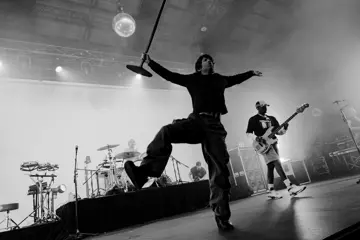Given the abundant adaptations of older works, it sometimes seems as though anything older than a decade or two is up for grabs when it comes to reinterpretations. 'Unfinished' works certainly seem to invite even more tinkering — and among the most frequently reimagined is Georg Buchner's working class tragedy Woyzeck.
Theatre director Robert Wilson teamed up with musicians Tom Waits and Kathleen Brennan for their own adaptation of Woyzeck, which premiered in 2000 in Copenhagen. Since 2010, the Hamburg-based Thalia Theater have toured a production of this musical reinvention - most recently to Bogota, Columbia, last year - and they will mount it for the final time as part of the Sydney Festival.
"It was a challenge for me, for us, to find a good way to combine the German text of Buchner and the songs of Tom Waits."
Speaking via email, Felix Knopp (who spent a decade from 2001 to 2011 developing his craft at Thalia Theatre as a member of their ensemble, and has continued to work with them in a freelance capacity as Woyzeck has continued to tour) expresses the significance of finally bringing the work to Australia. "In Sydney we will play our last show, so for both the company and I it is a very special event."
This was an interesting role for Knopp to land, for despite his acting prowess and a gig fronting rock band My Darkest Star, he doesn't really like musicals.
"For me, the most important part of this adaptation was the encounter of theatre and music. It was a challenge for me, for us, to find a good way to combine the German text of Buchner and the songs of Tom Waits. I don't like musicals that much and so we worked very hard to find an expression that on one side is still the musical and on the other side reaches the dark and powerful world of Buchner's great play. Woyzeck was a chance for me to perform in a musical for the first time, and a most profound one."
Don't miss a beat with our FREE daily newsletter
Director Jette Steckel presents on one hand the poor German underclass speaking gutsy pre-Brechtian German. On the other, introspection through Waits' English songs; the two held together by the taut grid of steel and rope that forms the centre of Florian Losche's set.
Before laying the character to rest, Knopp reflects on how he sees his character of Franz Woyzeck — lowly, perhaps, but far from defeated. "He's an outsider. Daily life is not his thing. That brings a kind of isolation and isolation is always dangerous. For me it was very important not to be stuck in the traditional perspective of Woyzeck as a poor victim. There is still vitality; there is a kind of revolutionary energy inside of Woyzeck. His hallucinations also have their clear prophetical part. He sees here that is something going wrong with mankind ignoring moral rules, and that creates troubling effects. The nature will answer. Mankind will answer. And so Woyzeck answers, unfortunately in a very cruel way. He can't see any other option, which is pure tragedy."















